Broadcasters usually get two years or more to organise and deliver an Olympic Games, but current rights holders though have had to organise two Games – Tokyo 2020 and Beijing Winter Games 2022 – in a sixth month period.
Leading the way for Seven on its Beijing Winter Games coverage are head of sport Lewis Martin and primetime co-host Hamish McLachlan.
In the first of two pieces about the network’s coverage of the Beijing Winter Games, Mediaweek’s James Manning speaks with Lewis Martin.
When asked about Seven’s primetime co-host, Lewis Martin said of Hamish McLachlan: “When you look at commentators who are elite preparers, you would list Bruce McAvaney, McLachlan and Johanna Griggs. When it comes to Olympics, they are absolute leaders in preparation. The is definitely a McAvaney influence across our Olympic presenters. Matty Shirvington is another who is the same.

Seven’s head of sport Lewis Martin
“The research efforts the presenters go to is part of a standard that Bruce set that permeates the Seven Sport culture.”
Martin then explained why that culture is important. “What we have a responsibility to do is to share the athletes’ story with Australia. You can’t make that up on the spot. The planning and preparation from Hamish and the other presenters is also undertaken by our teams in broadcast logistics, planning and design to make sure that each athlete and their journey is covered respectfully to the moment they compete.
“It might be when an AFL player crosses that white line or when an Olympian stands at the top of the ski jump or the mogul. That is their moment and it was likely 10 years in the making. It warrants respect and that’s why I am so impressed by our team both on and off air.”
Seven kicked Olympic goals as audiences warmed to its Tokyo coverage, something that Seven can look build on for Beijing. Martin: “We learnt a lot from Tokyo and it all goes back to the athlete and the viewer. We will again be wanting to celebrate the extraordinary.
“We will be covering the Winter Games from seven different locations. We have lot of confidence in the people and the technology.” The locations include studios at Seven in Melbourne, Perth and Sydney plus three in China at Zhangjiakou and elsewhere.
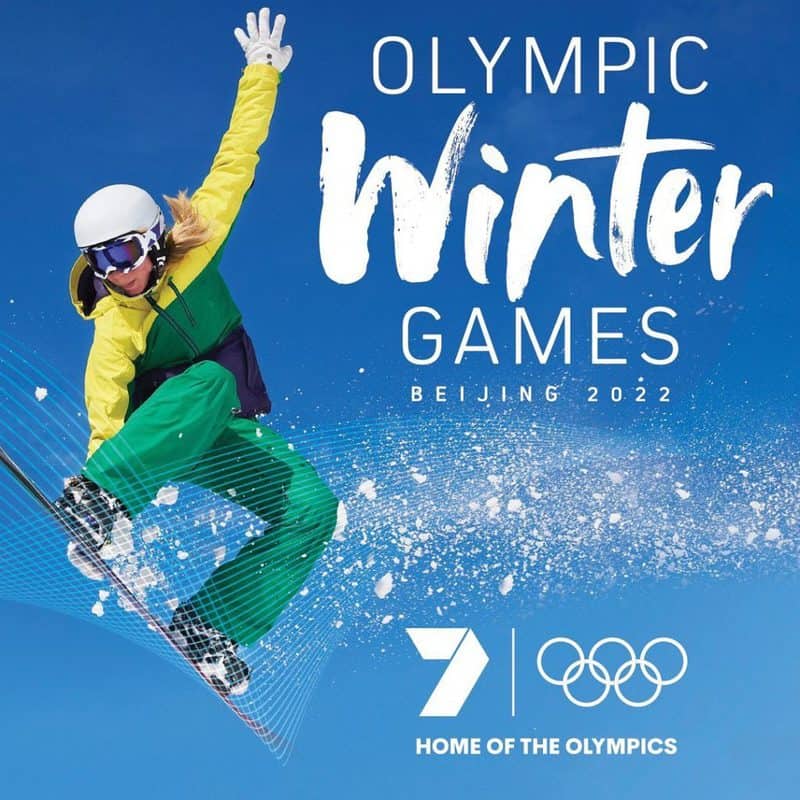
Martin noted a big hit with viewers last year was coverage of the 2020 Tokyo Games on 7plus. “For example we had a football semi-final between Mexico and Brazil on 7mate. It went into extra time and clashed with the Hockeyroos next match. We had to tell the 7mate audience, in the middle of a penalty shoot-out, they had to move to 7plus. From watching the audience metrics live, we saw the 7plus audience for that game instantly lift by 86,000 and there wasn’t a mention on any social media.
“We now make no distinction between linear and digital, and neither do the viewers. The Olympics have demonstrated the power of 7plus and how we know it is so loved.”
Martin enthused about the giant Seven studio screen as much as presenter Hamish McLachlan did during our Seven Winter Olympic interviews. Martin told how the screen nearly didn’t arrive from China into Melbourne in time for Tokyo 2020 after a Covid shutdown in Hong Kong.
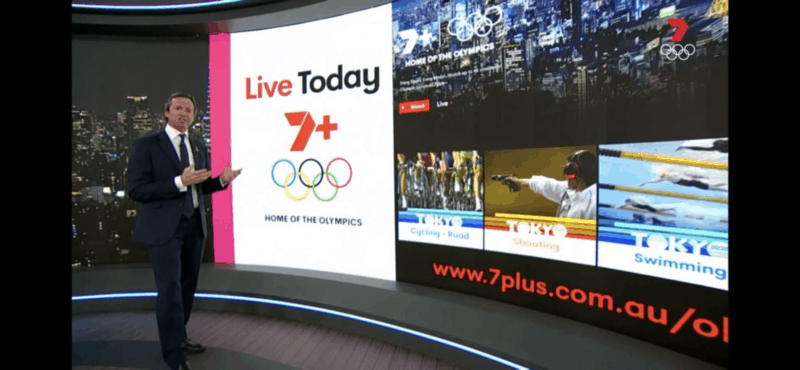
Seven Tokyo 2020 with host Hamish McLachlan in front of that big screen
“We had to bring it in Australia eventually as luggage to get it here. It is a 1.8mm pixel screen. The majority of TV screens are 3.8mm (the distance between each pixel).
“The pixels on our screen are much closer together and that enables presenters like Hamish or Abby to get up very close to the screen and interact with it and it won’t impact the visual outcome from the camera.
“The screen has played a big part in our broadcast strategy based on remote locations. It has been a passion project, but it has been worth every bit of emotion and anxiety…and the cost.”
Martin noted there are 43 Australians competing at the Winter Games and 10 alone in competition on the Thursday night this week before the Opening Ceremony. “We have competitors in the curling and that competition runs for five days.”
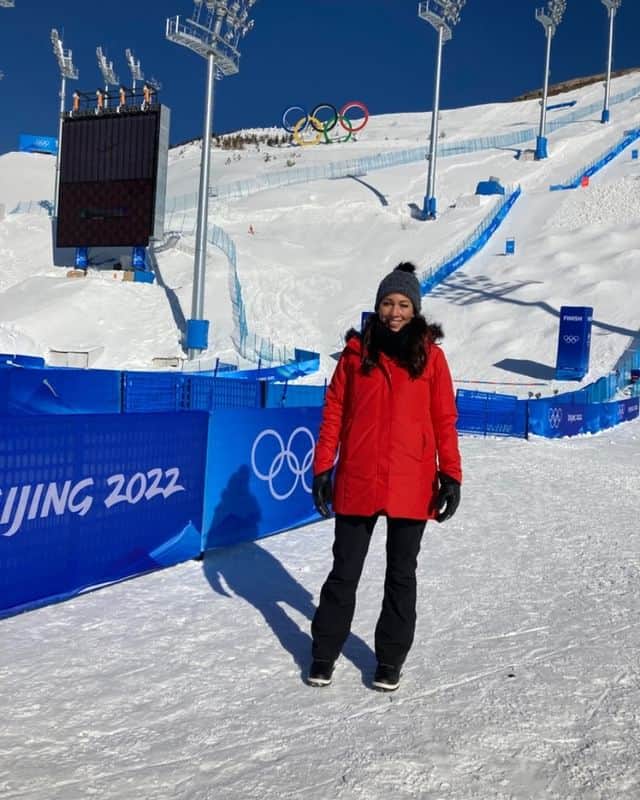
Mel McLaughlin in Zhangjiakou
Lewis Martin on Seven’s sport schedule
“There’s never been a schedule like this in the history of television” is not just a tagline to sell commercial partnerships. Lewis Martin has explained to Mediaweek before about the run of premium sport that the broadcaster has secured.
Seven’s current run of major events started last year with the AFL and then carried on through 2021 with the Tokyo Summer Games and then The Ashes. All of Seven’s regular sport is further complemented with the Beijing Winter Games and the Birmingham Commonwealth Games in 2022.
“It is a very strategic opportunity for Seven to have the Winter Olympics. It gives us a huge platform to talk about forthcoming programs like SAS Australia and others. The event is playing a big role in launching our year.”
There is just a three-week gap between Beijing and the start of the new AFL season. In that time Seven will squeeze in AFLW, Australian women’s cricket and horse racing continuing.
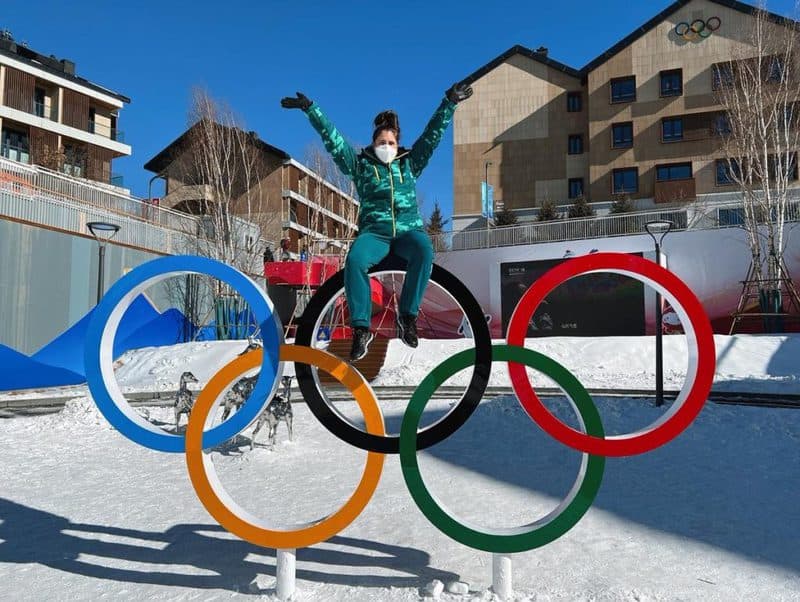
Australian Olympian Bree Walker in Beijing
“There also plenty of motorsport coming and then we have the 2022 Commonwealth Games in July.” Supercars launches in 2022 with two meets in March.
But the focus this month is on Beijing and Martin wanted to finish the interview noting the contributions from across the board at Seven. “All the different programs from Sunrise to News, the sales teams, tech departments, engineers, marketers, promotions. The amount of resources we are afforded to deliver this broadcast is phenomenal and is now part of Seven’s DNA.
“In no particular order, my team’s job is to deliver for the athletes, the viewer and the advertiser. Each of those groups make it possible and our job is to make sure that everyone gets to share that athletes’ experience.
“Every day we talk to our sales team and make sure the advertiser investment is monitored and managed. That is not just [Seven’s Chief Revenue Officer – Director of Olympic, Paralympic & Commonwealth Games] Kurt Burnette’s job, buy my job and the job of our Olympic executive producer Nick Barrow.
“We just don’t look at ratings. We make sure all the advertiser investments have all been scheduled and executed with respect that investment deserves.”
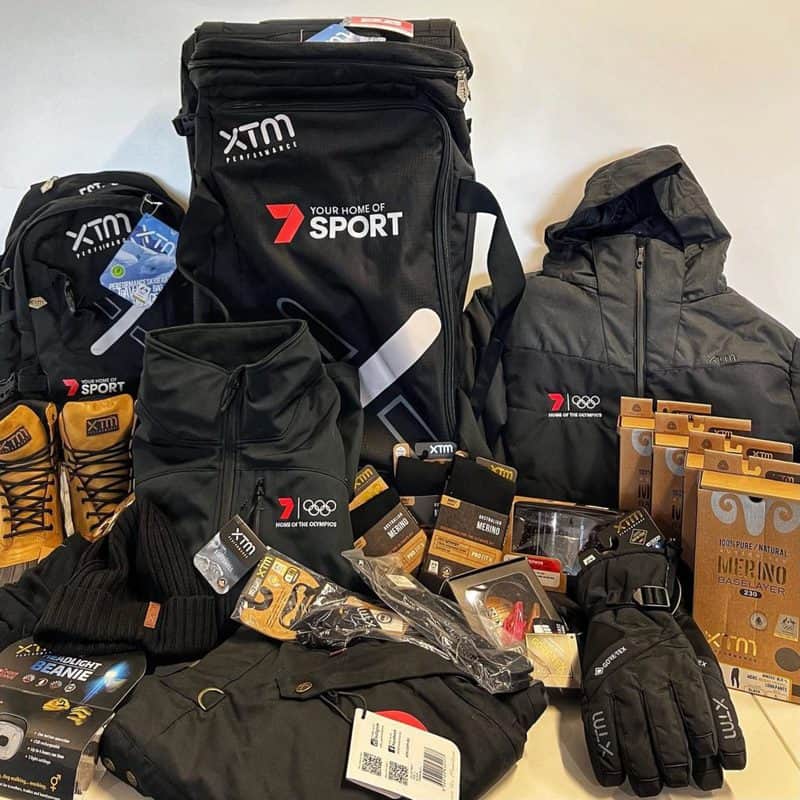
The kit that Seven reporters get for the Beijing Winter Games
Seven’s team at Beijing Winter Games
There are seven reporters on the ground in China working on Winter Games coverage – Mel McLaughlin, Mark Beretta, Jason Richardson, Lydia Lassila, Matt Beijing Carmichael, Jacqui Felgate and David Woiwod. Martin said they are part of the network’s China team of 32 people working for News, Sunrise and Seven Sport. “They are being very well looked after and they are very organised.” Dacien Hadland (Seven’s planning manager – Olympic & Commonwealth Games) is running operations in China. Martin said the tech now is so good it doesn’t feel like any of the team are far away. “Distance is just not an issue anymore.”
The commentating team features the same stars that excelled in the coverage from Tokyo last year. There’s no role for Ian Thorpe though. “I spoke to him recently,” said Martin. “We love to have him back for the Commonwealth Games.”
See also:
Beijing Winter Olympics: Meet the commentators and hosts
